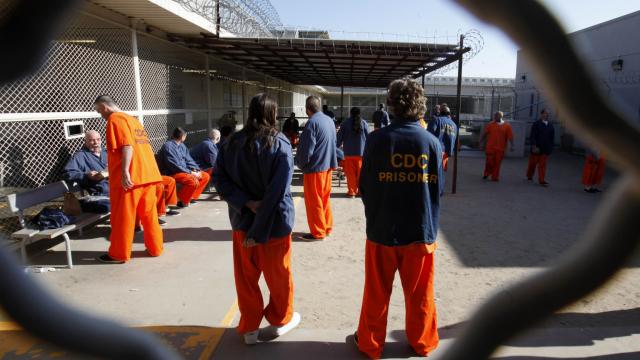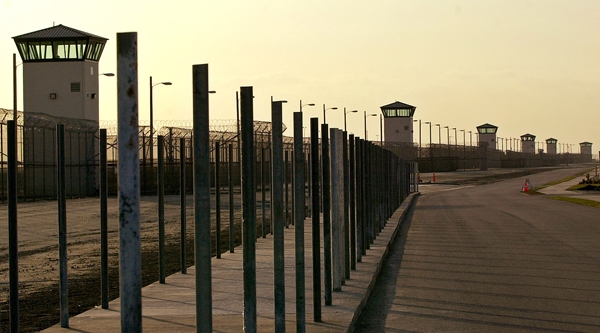
Hundreds of hunger-striking inmates in California have now gone one month without food in a stated effort to end the state's controversial solitary confinement practices. Everyone agrees on that much. But prison advocates and state officials disagree about virtually everything else related to the strike - including who bears responsibility for the death of one incarcerated participant.
Billy Sell, 32, was found dead in his ultra-restrictive Security Housing Unit (SHU) cell at Corcoran State Prison on July 22nd. The California Department of Corrections & Rehabilitation (CDCR) initially denied his participation in the ongoing hunger strike, but later acknowledged that by July 11th Sell, who had reportedly been in solitary for five years, had missed the requisite nine meals needed to count as a hunger striker, and had only resumed eating a day before he died. Inmate advocates say Sell was heard screaming for medical attention in the days leading up to his death. Prison officials deny this claim.
"There is no evidence that his suicide, which was a tragic event, was related to the hunger strike," says Terry Thorton, CDCR's deputy press secretary. When CDCR first acknowledged Sell's death, she said that advocates for striking prisoners "are shamelessly exploiting a man's death to mislead the public about a hunger strike orchestrated by violent gang members."
Isaac Ontiveros, an activist with an inmate support network, counters that it is "insane" to divorce Sell's death from the conditions that led to the strike.
"Here's this guy who's being tortured, he's in solitary, for years and years," says Ontiveros. "He's in solitary in a prison system that the U.S. Supreme Court has basically condemned for its terrible health conditions . . . I think however he died, it is clear that the prison system has responsibility for his death."
In a statement issued after Sell's death, Amnesty International said, "This case underscores our concerns at treatment of and conditions for prisoners in CA SHUs, whether or not they are participating in the hunger strike."
The strike began on July 8th, when 30,000 prisoners in two-thirds of the California's lock-ups intentionally missed their ninth consecutive meal, marking the official beginning of the hunger strike. (CDCR policy does not recognize a hunger strike until this threshold is met.) A week into the demonstration, as many as 12,000 inmates were continuing to turn down food - more than twice the number who launched a similar hunger strike in 2011.
As of early August, 364 prisoners in seven California prisons were continuing the strike, according to CDCR, with more than 200 refusing food since the beginning of the protest. Organized by a small group of inmates at Pelican Bay State Prison, the hunger strikers have listed five core demands <<http://www.rollingstone.com/politics/news/the-five-most-important-demands-from-the-california-prison-hunger-strike-20130716>>, which include a call for "regular meaningful contact and freedom from extreme physical deprivations that are known to cause lasting harm," quality health care, nutritional food and the immediate release of all prisoners who have been indefinitely held in isolation for 10 to 40 years back into the general population.
Thorton attributes the many factual disputes between advocates and prison officials to simple misinformation. "It's hard to know where to start," she says. "People get the size of the cells wrong. They say that inmates are deprived of human contact, and that's not true at all."
Thorton says SHU prisoners are allowed visits with their families, friends and attorneys, receive mail and enjoy TV and radio privileges in their cells. They also speak to one another (through vents or yelling out of their cells), Thorton says, and enjoy the same "heart healthy" diet that everyone else in the California prison system is treated to. Thorton adds that SHU prisoners also exercise for 90 minutes a day alone in a cement pen.
If things aren't so bad in solitary, as prison officials claim, why are so many prisoners striking? Since the beginning, CDCR has blamed the hunger strike on four powerful prison gangs, known as the Mexican Mafia, Nuestra Familia, the Black Guerrilla Family and the Aryan Brotherhood.
These gangs, Thorton says, are exploiting the good will of advocates and supporters in an effort to be moved back into general population, where they can more easily direct criminal activity. As evidence, she points to the sworn statements of two inmates, both SHU prisoners and former prison gang members, gathered to refute a federal lawsuit challenging CDCR's confinement practices.
Even the term "solitary confinement" - a phrase that no U.S. prison officially uses - is up for debate. "There is no such thing as solitary confinement in California prisons," Thorton insists. Asked how she would define solitary confinement, she says, "I wouldn't, actually. What I envision it to be is something you see in a movie - something that people engaged in in the 1700s or the 1800s."
Thorton also rejects the claim that CDCR is responsible for torture, an allegation frequently leveled against California's SHU policies. "It's not torture, because it doesn't even fit the definition of torture," Thorton says, citing the state's penal code, which stipulates that for an individual to be found guilty of torture they must act with "the intent to cause cruel or extreme pain and suffering for the purpose of revenge, extortion, persuasion, or for any sadistic purpose."
Yet, whether or not California's SHU facilities violate state law, some of the state's policies and practices mirror conditions that international human rights experts say could amount to torture. In 2011, a United Nations torture rapporteur called for an absolute and international ban on indefinite and prolonged solitary confinement, which he defined as any practice in which an inmate is held in isolation from others, except guards, for at least 22 hours a day. He argued that just a few days locked up alone in a cell has been shown to produce lifelong mental health problems. Solitary confinement in excess of 15 days, the rapporteur said, can be described as torture.
This is not just a matter of semantics: University of California-Santa Cruz psychology professor Craig Haney, who was granted the rare opportunity to study 100 Pelican Bay prisoners, warns that solitary confinement practices such as those on display in California place prisoners at "grave risk of psychological harm." Psychiatrist Stuart Grassian has even coined the term "SHU syndrome" to describe symptoms of hallucination, confusion, paralyzing anxiety and revenge fantasies he has observed in prisoners.
As of December 2012, at least 11,700 prisoners were being held in some form of isolation in California. More than 3,800 of them were serving indefinite sentences in the state's SHU units. California's SHU practices have been the subject of numerous lawsuits, including a federal class action suit filed last year on behalf of ten Pelican Bay inmates who have collectively spent over two centuries locked up alone.
The 7x12-foot SHU cells were originally designed to house violent gang members and their associates. Yet a substantial body of evidence indicates that scores of men have been put through years of isolation as a result of tenuous or non-existent gang ties; nearly 80 percent of current SHU inmates are not classified as gang leaders or members. (CDCR says that it is reforming its gang validation process.)
Prison advocates say it is exceedingly difficult to gather and corroborate information from within California's prison walls. "It's really horrible how little you can find out, and how late," says Marilyn S. McMahon, a prisoners' rights lawyer and executive director of California Prison Focus. McMahon represents a number of prisoners who have gone on strike in California.
Ten days after the strike began, California prison officials notified her that she had been cut off from her clients due to an unspecified "threat" created by a retired paralegal who once worked as a volunteer for her. McMahon was also banned during the 2011 strike; once that protest ended, she says, the ban was lifted and CDCR determined that there had been no wrongdoing. "Prison staff operate under cover of darkness," she says. "Predictably, abuses occur."
Thorton insists that prison advocates just need to face facts. "People say they need sunshine, they need transparency - they already have that," she says. "We're telling the truth. They have an agenda." This, then, is the truth, according to Thorton and the CDCR: "Yeah, people are in prison for a long time, and there are people who have been in Security Housing Unit for a long time. I'm not saying that they're not. But is it torture? Is it solitary confinement? No, it's not."
Needless to say, that's not how prison reform advocates see it. "They can justify all these things," says Ontiveros. "But at the end of the day, I think they're trying to justify torture."
3 WAYS TO SHOW YOUR SUPPORT
- Log in to post comments

















